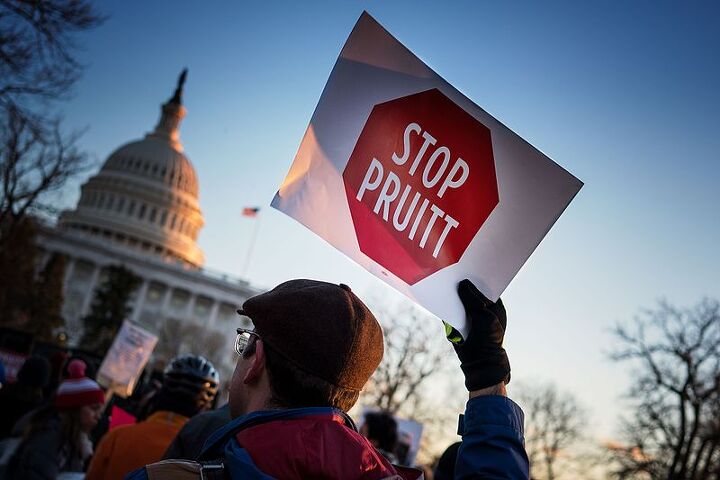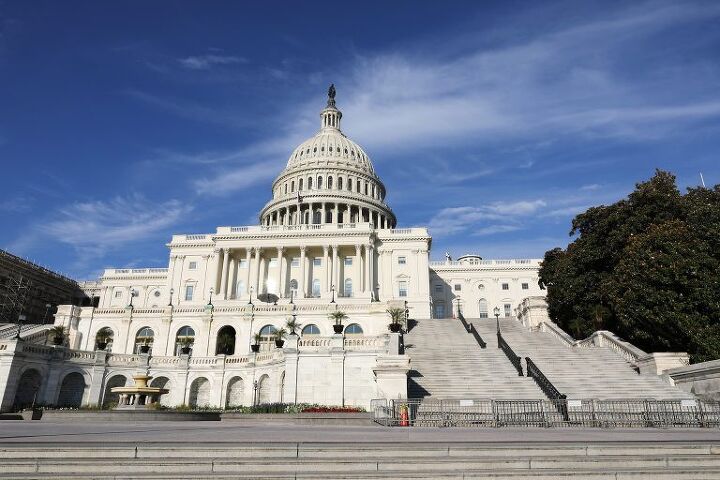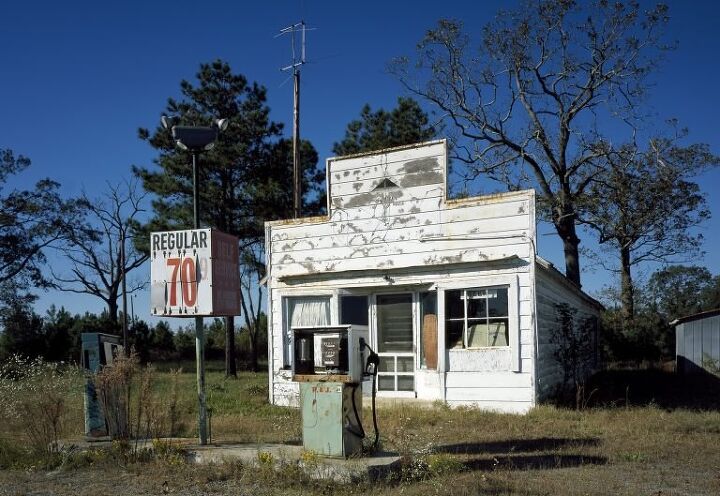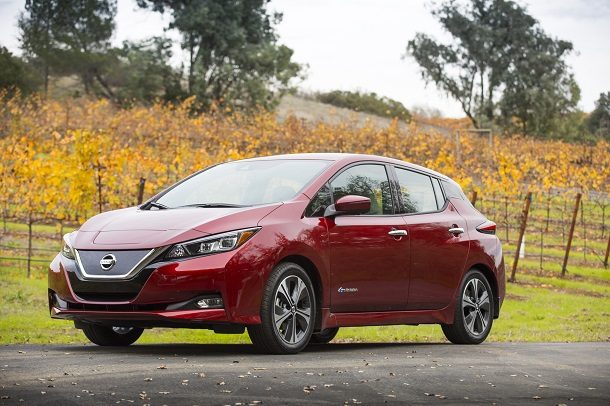#EPA
Replacement EPA Boss on Board With California Gas Confab
Following Andrew Wheeler’s appointment as acting head of the Environmental Protection Agency, he extended an invitation to the California Air Resources Board to discuss emission regulations — a matter which former EPA administrator Scott Pruitt seemed less inclined to discuss with the state.
Mary Nichols, chairman of the board, said Wheeler reached out to state officials and the pair agreed to hold a meeting in Washington. It’s a slight easing of tensions in the cold war between D.C. and Sacramento.
Endless Pressure and Public Scandal Leads to Pruitt's Resignation as EPA Head
Environmental Protection Agency Administrator Scott Pruitt, who spearheaded the Trump administration’s initiative to roll back Obama-era fuel economy standards for light vehicles, has resigned. Even after assuming the position, Pruitt remained a tough sell as head of the EPA. His stance on climate change was uncharacteristic of any modern-day environmentalist and he seemed utterly bent on corporate deregulation to bolster profits and stimulate the economy.
Then came a flurry of scandals stemming from frivolous spending habits, improper use of authority, and possible business ties that would inhibit his ability to act in an unbiased manner. Numerous federal investigations were launched into these matters.
While a number of the impropriety claims came from political opponents actively hunting for gaps in his armor, let’s face it, Pruitt hasn’t been making things particularly difficult for them.
Gabbing on Gas: White House and California Still On Speaking Terms
Despite the growing animosity, both California and the Trump administration are still willing to discuss the country’s changing emission regulations. The state is currently heading a lawsuit against the Environmental Protection Agency, claiming it “acted arbitrarily and capriciously” in overturning the previous administration’s decision to maintain Corporate Average Fuel Economy standards.
While the proposals issued by the current administration will eventually see those targets rolled back, a final decision has not been made. The White House claims it wants to maintain an open dialogue with the Golden State, hoping to reach an agreeable solution, but the California Air Resources Board has argued it doesn’t seem to be acting on those assertions. Meanwhile, EPA head Scott Pruitt maintains that the state will not dictate federal fueling rules as automakers beg the government to do everything in its power to ensure a singular national mandate.
It’s an ugly situation, which makes news of a new round of meetings all the more surprising.
This is a Mess: EPA Begins Quest to End California's Fuel Waiver
The Trump administration has enacted phase two of its plan to revise Obama-era rules designed to cut pollution from vehicle emissions. In a proposal sent to the White House Office of Management and Budget on Thursday, the Environmental Protection Agency announced its intention to rescind the California waiver that separates it from the federal standards the state uses to regulate greenhouse gas emissions from automobiles.
Since allowing California to set its own emission standards would effective split the country’s auto market, the EPA has been clear that its ideal solution would be to cut a deal with the Golden State. Agency head Scott Pruitt previously said California “shouldn’t and can’t dictate [fueling regulations] to the rest of the country,” but acted in a manner that suggested a compromised could be reached.
This was followed by a lawsuit filed by 17 U.S. states, along with the California governor’s office, California attorney general, and the California Air Resources Board (CARB), alleging that the EPA had “acted arbitrarily and capriciously” in its decision to roll back the previous administration’s decision. While the odds are good that the Trump administration wasn’t ever interested in bending to California’s more stringent pollution policies, this was likely the point of no return — squashing any hope for meaningful negotiations.
Rebuking the Rollback: Science Advisors Claim EPA Ignoring Its Own Fuel Economy Research
Several science advisers for the Environmental Protection Agency claim the agency has ignored its own research in order to rationalize the push to relax corporate average fuel economy (CAFE) targets.
A group within the Science Advisory Board has recommended reviewing the EPA’s justifications for the intended rollbacks, including the agency’s conclusion that Obama-era auto efficiency requirements must be changed because they are too stringent. It’s hoping to take the agency to task and force it to show evidence that upholds is proposal.
While EPA head Scott Pruitt sides with the President and automotive industry by indicating the current standards are too strict, very little scientific research has been cited to support the claim. In fact, the revision seems to hinge mainly on the belief that automakers might not be able to adhere to the standards approved by the Obama administration in its final days. “Obama’s EPA cut the midterm evaluation process short with politically charged expediency, made assumptions about the standards that didn’t comport with reality, and set the standards too high,” Pruitt said in April.
Automakers to White House: Make a Deal With California on Fuel Economy
Despite pressuring Donald Trump to lower corporate fuel economy mandates since practically day one of his presidency, automakers are now urging caution. The U.S. Transportation Department has drafted a proposal that would freeze vehicle requirements at 2020 levels through 2026, the Environmental Protection Agency’s lead administrator made a public case for rolling back mileage targets, and the White House seems ready to help car companies lower the bar.
Automakers seem to have won, so why the change of heart?
Four-cylinder Jeep Wrangler Packs on the MPGs
The 2018 Jeep Wrangler JL is not the inline-six-powered, aerodynamic brick it was in years past. For the current generation model — now the only Wrangler built in Toledo — Jeep’s Jeepiest Jeep saw a host of improvements designed to lighten its curb weight, reduce aerodynamic drag, and cover more ground on a gallon of gas.
The model launched with only the 3.6-liter Pentastar V6 under its hood, aided in its fuel-sipping mission by standard stop/start and an eight-speed automatic transmission. Depending on the model and tranny, combined fuel economy rose 2 mpg between the old JK and newer JL models, and highway mileage rose as much as 4 mpg.
Finally, we now have EPA figures for the turbocharged 2.0-liter four-cylinder Wrangler.
EPA Head Defends Fuel Economy Rules, Industry Ties On Capitol Hill
Environmental Protection Agency chief Scott Pruitt spent the majority of his Thursday being raked over the coals by the House Energy and Commerce subcommittee before a second (even uglier) exchange with the House Appropriations subcommittee. The majority of the time was spent addressing concerns surrounding Pruitt’s expenditures — things like unnecessary first-class travel, a $43,000 soundproof phone booth, and his 24-hour security team. There were also discussions about alleged death threats against Pruitt and EPA staff, his overall conduct, and even a little bit on environmental policy.
Those discussions, however, saw some subcommittee members accuse Pruitt of championing the profits of oil companies and automakers over the wellbeing of the planet. The EPA head spent the duration of Thursday defending his actions, including planned regulatory rollbacks on fuel economy. He also supported the automotive industry’s proposal to abolish 87 octane and replace it with 95.
As ugly as the day was for Pruitt, Republicans occasionally hopped on the mic to gently support him. Rep. Kevin Cramer of North Dakota said, “I think the greatest sin you’ve done is, you’ve actually done what President Trump ran on.”
America's Gas War Begins
Now that the Environmental Protection Agency has officially confirmed its intent to roll back Corporate Average Fuel Economy (CAFE) standards, the opposition has kicked things into high gear, mobilizing for the coming battle.
In one corner you have the White House and EPA Administrator Scott Pruitt seeking lowered emission mandates. They claim the Obama administration created unfeasible fueling regulations, noting that the public regularly opts for less-efficient trucks and SUVs and largely ignores the purchase of electric vehicles. In the other corner you have a handful of Senate Democrats, environmental groups, and a bunch of blue states led by California lawmakers. They all say the preexisting rules are not only feasible, but essential for the good of the nation.
If you’re wondering which side of the highly partisan issue is correct, we’d argue it has almost everything to do with your point of view. Both sides can make a fairly strong case, and will do just that as the battle heats up. Fortunately, this may not end up being a legitimate civil war — if the California Air Resources Board (CARB) is to be believed.
Triumph or Tragedy? EPA Officially Sides With Automakers on Fuel Economy Rollback
It looks as if the United States will find out if softened fuel economy targets will transform the domestic market into a haven for automobiles with exquisite powertrains or an antiquated dinosaur with garbage cars making use of old, pollution-friendly tech.
As predicted, the Environmental Protection Agency officially announced its intent to roll back Corporate Average Fuel Economy (CAFE) standards this week. On Monday, EPA head Scott Pruitt indicated his agency would begin the formal regulatory process with the Department of Transportation’s National Highway Traffic Safety Administration (NHTSA) to lower the existing MPG rules.
For the most part, Pruitt avoided diving deep into the NHTSA’s past claims of larger vehicles being safer and the manufacturing pitfalls associated with rushing cutting-edge technology to market — two issues we expected to be addressed. Instead, he left the announcement rather basic by stating the Obama-era rules were “not appropriate and should be revised.” The cornerstone of the EPA’s argument is that Americans simply aren’t buying more efficient automobiles, despite their current availability, and automakers have grown concerned with meeting CAFE standards after 2022.
“The Obama administration’s determination was wrong,” Pruitt said in a statement. “Obama’s EPA cut the midterm evaluation process short with politically charged expediency, made assumptions about the standards that didn’t comport with reality, and set the standards too high.”
EPA Readies Rollback of Fuel Efficiency Regulations
Rumors are flooding in that U.S. Environmental Protection Agency Administrator Scott Pruitt will sign a declaration upending the Obama-era fuel economy regulations any day now. New details have emerged claiming Pruitt plans to visit a Chevrolet dealership in Virginia to publicly condemn the existing 2025 targets as unrealistic. Reportedly scheduled for next Tuesday, the EPA head will be accompanied by groups representing both automakers and car dealers.
California is going to be furious.
It's Gonna Be a Showdown: EPA Head Says California Won't Drive U.S. Fuel Regulations
The Trump administration’s chief environmental regulator claims the Environmental Protection Agency will not pursue stricter fuel economy mandates after 2025. EPA Administrator Scott Pruitt also said California won’t call the shots for the rest of the country just because it can set its own rules on emissions.
“California is not the arbiter of these issues,” he said. Currently, California and 16 other states have pledged to maintain Obama-era emission when federal regulators decide to roll them back “but that shouldn’t and can’t dictate to the rest of the country what these levels are going to be,” according to Pruitt.
Stick that in your tailpipe, one-third of America.
Feds Ready to Hit Fiat Chrysler With Big Fines: Report
Fiat Chrysler Automobiles might need the 2019 Ram 1500’s newly increased payload capability when it comes time to visit the bank.
As we’ve told you since the scandal broke a year ago, FCA could find itself on the hook for hefty penalties after the Environmental Protection Agency slammed it for failing to declare a bevy of auxiliary emission control devices on its 3.0-liter diesel V6 engine. With the 2017 and 2018 Ram and Jeep EcoDiesel models now in compliance, the question becomes: what does FCA pay to settle the fallout?
According to documents obtained by Bloomberg, it seems the monetary fine sought by the U.S. Justice Department might not fit in the pickup bed.
EPA Says the 2018 Nissan Leaf Goes the Extra Mile - Literally
What a difference a mile makes. Or does it? In the case of the 2018 Nissan Leaf, the second-generation model’s newly enlarged driving range might not sway a single buyer or suddenly place the model ahead of a close challenger, but any improvement in an EV’s travel radius is worthy of a celebration at the company’s HQ.
If you haven’t heard the news, the 2018 Leaf’s range now stands at 151 miles, according to the Environmental Protection Agency’s just-released official rating. What was it before? Well, Nissan estimated 150 miles. Hardly shocking, but it’s nonetheless good news as the automaker waits for next year’s arrival of a longer-ranged, more competitive model.
New Vehicles Are More Powerful and Efficient Than Ever, but the Greenest Automaker Only Sells Gas Models: Study
Every year, the Environmental Protection Agency tabulates all available data for new vehicles sold in the United States and prints colorful graphs showing the country’s progress — or in some cases, regression — in key areas of autodom. Areas like average fuel economy, vehicle weight, horsepower, and emissions.
It’s a tradition dating back to the heady, wide-lapelled days of 1975.
The most recent report on light-duty vehicles in the U.S. shows definite, albeit incremental, progress towards many environmental goals. While the auto landscape may not be advancing at the rate preferred by many environmentalists, urbanists, and the Tesla fan base, there’s cause for celebration within the report’s pages. There’s also a special prize in there reserved just for Mazda.





























Recent Comments